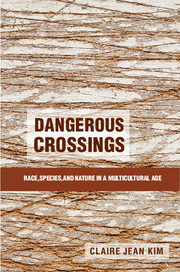Book contents
- Frontmatter
- Dedication
- Contents
- List of Figures and Tables
- Acknowledgments
- Part I Taxonomies of Power
- Part II The Battle over Live Animal Markets in San Francisco’s Chinatown
- 3 The Optic of Cruelty
- 4 The Optic of Racism
- 5 The Optic of Ecological Harm
- 6 Vision/Critique/Avowal
- Part III Other Disputes
- Part IV Conclusion
- References
- Index
6 - Vision/Critique/Avowal
Published online by Cambridge University Press: 05 April 2015
- Frontmatter
- Dedication
- Contents
- List of Figures and Tables
- Acknowledgments
- Part I Taxonomies of Power
- Part II The Battle over Live Animal Markets in San Francisco’s Chinatown
- 3 The Optic of Cruelty
- 4 The Optic of Racism
- 5 The Optic of Ecological Harm
- 6 Vision/Critique/Avowal
- Part III Other Disputes
- Part IV Conclusion
- References
- Index
Summary
We may disagree with some aspect of their [minority cultures’] moral, ethical, or evaluative practices without dismissing or holding in disrespect their life-worlds altogether. Most human encounters ... occur in this in-between space of partial evaluations, translations, and contestations.
– Seyla BenhabibIn the Chinatown live animal market conflict, the optics of cruelty, racism, and ecological harm highlight and challenge (or purport to challenge) different dimensions of power – human domination over animals, white domination over the Chinese, and human domination over nature, respectively. Each optic directs our focus to a specific issue in a particular way, even as it necessarily diverts our attention away from other concerns. Single-optic vision of this kind tends to lead in the course of political struggle to a posture of mutual disavowal, where each group elevates its own suffering and justice claims over the suffering and justice claims of the other group, either partly or wholly invalidating the latter as a matter of political and moral concern. Disavowal, an act of dis-association and rejection, can range from failing to recognize that one is causing harm to the other group to refusing to acknowledge that the other group suffers or has valid justice claims to actively and knowingly reproducing patterns of social injury to the other group.
The posture of mutual disavowal is unsurprising in one sense: politics as a struggle over scarce resources (material, symbolic, and other) is by its very nature oppositional – one is always mobilizing for and therefore against something, so disavowing an opponent’s claims and perspective is par for the course. The rub arises when one is mobilizing not against an oppressive majority but rather against another subordinated group (or, in the case of animal advocates, those representing a subordinated group). If we believe that justice requires the mitigation or cessation of various forms of social domination, the possible implications of disavowal here should give us pause.
- Type
- Chapter
- Information
- Dangerous CrossingsRace, Species, and Nature in a Multicultural Age, pp. 181 - 202Publisher: Cambridge University PressPrint publication year: 2015

